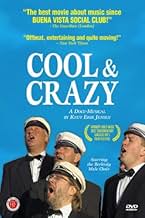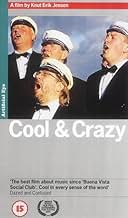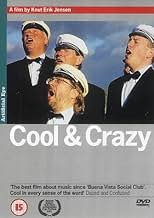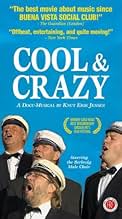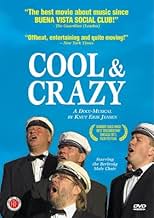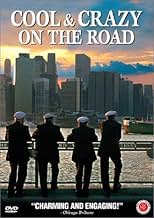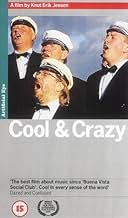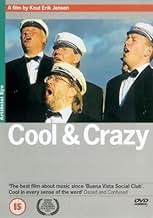IMDb RATING
6.9/10
770
YOUR RATING
Much as Buena Vista Social Club revealed a rich and unexplored world of music and culture, Cool and Crazy introduces us to a group of men who find purpose, companionship and even fame, as me... Read allMuch as Buena Vista Social Club revealed a rich and unexplored world of music and culture, Cool and Crazy introduces us to a group of men who find purpose, companionship and even fame, as members of a male choir in Berlevåg.Much as Buena Vista Social Club revealed a rich and unexplored world of music and culture, Cool and Crazy introduces us to a group of men who find purpose, companionship and even fame, as members of a male choir in Berlevåg.
- Awards
- 7 wins & 1 nomination total
Featured reviews
10larsga
This is the only movie I ever watched twice in a cinema. The first time I recall being confused at the end, being unable to tell if I was laughing or crying. Never, ever, did I have a movie experience like this.
Unfortunately, if you are not Norwegian, and you can't understand what the people in the movie are saying you will necessarily lose out on a lot. (A lot of inexplicable value and detail is in how they talk.) Also, if you don't know much about Norway and the arctic region there are lots of things you won't understand. As a an example picked at random, if you're Norwegian, the first 30 seconds are a pretty poignant meditation on the poverty of state charity in the richest oil nation on earth, but if you are not Norwegian it will be utterly incomprehensible. (On the other hand, it's only 30 seconds, so if you're not Norwegian you can just watch that floating past and ignore it.) What I really loved about the movie is the way it shows normal people (for Northern Norway, which means they're not really normal at all) not going about their normal business, but talking openly and honestly about the things that matter the most to them in their lives. The scene where the communist (at 70 degrees north near the Soviet Union during the cold war this actually meant something) ruminating about his freewheeling former life as a punk rock singer while brushing himself in the bathtub is priceless. 2-3 minutes of that alone is worth the price of buying the movie, watching it 5 times, *and* learning Norwegian so you can understand what the hell the guy is saying. ("Thinking back it often makes me sad. *leisurely stroke of the brush* Oftentimes it was just pure lust. *brushing soap out of his beard* You know, being the vocalist, you would be the most attractive. *breaks off, stares at soapy water*) This may sound ridiculous, but watching the movie it is painfully clear that for the guy in the tub, what he's talking about is the high point of his life, and here he's offering it freely, with no reservations, in the movie. It's only a few minutes altogether, and it alone is worth more than I could tell you. You may laugh, or you may cry, or you may not know which.
And so it goes, throughout the entire movie. The characters are frequently hilarious, frequently murderously honest (the drug addict talking about how he'd meet the coastal ferry on the quay every day in the hope of a talent spotter spotting him; the church organist on how the Luftwaffe put a metal plate into his head; the drug addict on the joys (and troubles) of having his own apartment for the first time; the convinced communist crying at a war memorial across the Russian border; the whole choir wordlessly aghast at the environmental destruction at the metalworks in Nikel...), and never anything less than absolutely riveting.
I think I could probably retell this movie frame by frame, despite having watched it only twice. Most parts of it are indelibly etched on the insides of my eyes. Forty years from now I may have forgotten the names of my grandchildren, and still remember the guy who keeps the photo of his first sweetheart (from when he was 16) on the living-room wall, despite his wife's disapproval (shhh! he tells the camera (the CAMERA!), and who still brushes his hair for best effect (with water) at 75, vain as a peacock, and who doesn't care at all that the whole world gets to see all of this.
And so it goes, on and on, throughout the entire movie. These people lay their lives bare in details so poignant and telling that the mere thought of it fills me with awe, and the end is sad because it means the end of the movie. It's touching, ridiculous, painful, and unforgettable. If I could only keep one movie out of the hundreds I've seen, it would be this one, and I would consider the loss of all the others pretty cheap.
If you can't understand Norwegian dialect, multiply the above by 0.8, as much of the nuance of what is said will be lost on you.
Unfortunately, if you are not Norwegian, and you can't understand what the people in the movie are saying you will necessarily lose out on a lot. (A lot of inexplicable value and detail is in how they talk.) Also, if you don't know much about Norway and the arctic region there are lots of things you won't understand. As a an example picked at random, if you're Norwegian, the first 30 seconds are a pretty poignant meditation on the poverty of state charity in the richest oil nation on earth, but if you are not Norwegian it will be utterly incomprehensible. (On the other hand, it's only 30 seconds, so if you're not Norwegian you can just watch that floating past and ignore it.) What I really loved about the movie is the way it shows normal people (for Northern Norway, which means they're not really normal at all) not going about their normal business, but talking openly and honestly about the things that matter the most to them in their lives. The scene where the communist (at 70 degrees north near the Soviet Union during the cold war this actually meant something) ruminating about his freewheeling former life as a punk rock singer while brushing himself in the bathtub is priceless. 2-3 minutes of that alone is worth the price of buying the movie, watching it 5 times, *and* learning Norwegian so you can understand what the hell the guy is saying. ("Thinking back it often makes me sad. *leisurely stroke of the brush* Oftentimes it was just pure lust. *brushing soap out of his beard* You know, being the vocalist, you would be the most attractive. *breaks off, stares at soapy water*) This may sound ridiculous, but watching the movie it is painfully clear that for the guy in the tub, what he's talking about is the high point of his life, and here he's offering it freely, with no reservations, in the movie. It's only a few minutes altogether, and it alone is worth more than I could tell you. You may laugh, or you may cry, or you may not know which.
And so it goes, throughout the entire movie. The characters are frequently hilarious, frequently murderously honest (the drug addict talking about how he'd meet the coastal ferry on the quay every day in the hope of a talent spotter spotting him; the church organist on how the Luftwaffe put a metal plate into his head; the drug addict on the joys (and troubles) of having his own apartment for the first time; the convinced communist crying at a war memorial across the Russian border; the whole choir wordlessly aghast at the environmental destruction at the metalworks in Nikel...), and never anything less than absolutely riveting.
I think I could probably retell this movie frame by frame, despite having watched it only twice. Most parts of it are indelibly etched on the insides of my eyes. Forty years from now I may have forgotten the names of my grandchildren, and still remember the guy who keeps the photo of his first sweetheart (from when he was 16) on the living-room wall, despite his wife's disapproval (shhh! he tells the camera (the CAMERA!), and who still brushes his hair for best effect (with water) at 75, vain as a peacock, and who doesn't care at all that the whole world gets to see all of this.
And so it goes, on and on, throughout the entire movie. These people lay their lives bare in details so poignant and telling that the mere thought of it fills me with awe, and the end is sad because it means the end of the movie. It's touching, ridiculous, painful, and unforgettable. If I could only keep one movie out of the hundreds I've seen, it would be this one, and I would consider the loss of all the others pretty cheap.
If you can't understand Norwegian dialect, multiply the above by 0.8, as much of the nuance of what is said will be lost on you.
7B24
Like the choir from Finnmark, I had occasion to visit northern Russia during the summer of 2000. They were as astonished as I to find a very sharp contrast indeed between their settled, middle-class lives at home and the chaotic waste of Murmansk. Yet they connected, as did I, with an initially reluctant and sombre Russian people. Consider for a moment what a hellish past those souls have to live with, compared with life in a northern Scandinavian fishing village which, except for 1940-45, has been recently no more than a leisurely slide into economic oblivion.
Listening to the casual words of the old Norwegian gentlemen as they bare their own personal histories, one senses this film is more than a documentary. It succeeds in assessing life much as a novelist might, engaging in subtle character sketches against the spectacular backdrop of midnight sun, roaring sea, blizzards, and the stark, ever-present silhouette of Arctic sky. It was like listening to one of Garrison Keillor's tales of "Norwegian bachelor farmers" who are a mainstay of Minnesota folklore.
As a sidenote, I was amused to hear the choir sing a hymn that was, if memory serves correctly, penned by a distant cousin of mine from Iowa in 1857. Sung with different words and in Norwegian, of course. It began life as "The Little Brown Church in the Vale" and has evolved into something sung with exactly the same sense as a memory of a white church in Finnmark.
Crossing boundaries often results in noting that life is very much the same everywhere among common folk. Wherever you go, there you are.
Listening to the casual words of the old Norwegian gentlemen as they bare their own personal histories, one senses this film is more than a documentary. It succeeds in assessing life much as a novelist might, engaging in subtle character sketches against the spectacular backdrop of midnight sun, roaring sea, blizzards, and the stark, ever-present silhouette of Arctic sky. It was like listening to one of Garrison Keillor's tales of "Norwegian bachelor farmers" who are a mainstay of Minnesota folklore.
As a sidenote, I was amused to hear the choir sing a hymn that was, if memory serves correctly, penned by a distant cousin of mine from Iowa in 1857. Sung with different words and in Norwegian, of course. It began life as "The Little Brown Church in the Vale" and has evolved into something sung with exactly the same sense as a memory of a white church in Finnmark.
Crossing boundaries often results in noting that life is very much the same everywhere among common folk. Wherever you go, there you are.
Why would anyone want to see a film about the lives of people in a mens' choir in Northern Norway? I first saw this film in Norway without subtitles. As my command of Norsk is not so good, I missed much of the nuance but still enjoyed this delightful film. I now own a copy with subtitles and love sharing it with friends and family. As a professional musician I delight in a story of music bringing people from all walks of life and generations together. This film conveys that and more.
It shows how economic and physical hardship and adversity are not barriers to a fulfilling and happy life. Some may think it trivializes the lives of the subjects of the film, but I feel it celebrates them. It shows us how all our lives however ordinary they may seem to us, can be inspirational to others.
Sport is often lauded for its heroes, yet this film conveys the team spirit of a mens choir striving for a collective and individual best. Their pride and enthusiasm is infectious and uplifting as is their earthy humour.
This film is all that a blockbuster is not. It is about the human condition, about community, about respect for others and about real people.
It shows how economic and physical hardship and adversity are not barriers to a fulfilling and happy life. Some may think it trivializes the lives of the subjects of the film, but I feel it celebrates them. It shows us how all our lives however ordinary they may seem to us, can be inspirational to others.
Sport is often lauded for its heroes, yet this film conveys the team spirit of a mens choir striving for a collective and individual best. Their pride and enthusiasm is infectious and uplifting as is their earthy humour.
This film is all that a blockbuster is not. It is about the human condition, about community, about respect for others and about real people.
Its a movie about life and life expectations in general from your point of view. Your point of view may be extremely different from whats portrayed in the movie, and thats excactly what makes this movie brilliant.
"Heftig og Begeistret" is a truly wonderful movie. Within the limits of a documentary, it says everything that could be said about life generally and life in the North of Norway especially. The singers in Berlevåg Mens-choir are the subject of the film, and we follow them for about a year, both when they sing, and when they are at home.
The beauty of having men standing next to the great ocean, singing songs unaffected of the weather (they are singing in rain, snow, storm and midnight sun), cannot be explained, it must be viewed. Further, there's the great amount of funny one-liner's these old guys present to us. (As the 96 years old man says about his bedroom: "This used to be a working room, now it's a museum.")
Then again, the movie shows how politics have separated the world, even at a small place like Berlevåg. During their tour to Murmansk, communists among the singers clash with the others, as the destroyed nature of the former Soviet Union comes to view. And it's a strong scene when one of the old communists burst into crying when he comes to a memorial place from WWII.
Perhaps the genius of the movie is the fact that anyone can recognize the people in the movie with someone you already know.
The beauty of having men standing next to the great ocean, singing songs unaffected of the weather (they are singing in rain, snow, storm and midnight sun), cannot be explained, it must be viewed. Further, there's the great amount of funny one-liner's these old guys present to us. (As the 96 years old man says about his bedroom: "This used to be a working room, now it's a museum.")
Then again, the movie shows how politics have separated the world, even at a small place like Berlevåg. During their tour to Murmansk, communists among the singers clash with the others, as the destroyed nature of the former Soviet Union comes to view. And it's a strong scene when one of the old communists burst into crying when he comes to a memorial place from WWII.
Perhaps the genius of the movie is the fact that anyone can recognize the people in the movie with someone you already know.
Did you know
- ConnectionsFeatured in Temalørdag: Mandskor og hornmusik (2004)
Details
Box office
- Gross worldwide
- $3,130
Contribute to this page
Suggest an edit or add missing content


